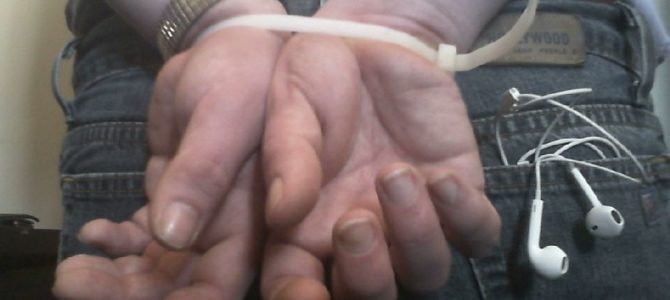
The U.S. Supreme Court (SCOTUS) is set to hear several blockbuster cases this fall that they pushed off following the death of Justice Antonin Scalia, knowing the court would likely be deadlocked. They will hear a case involving whether government can search cell phone records, and the well-known case involving a rare blend of questions about free speech and free exercise of religion, Masterpiece Cakeshop v. Colorado Civil Rights Commission.
SCOTUS is hearing another case today that’s not infamous but still important, as it involves the complex and often-misinterpreted Fourth Amendment: District of Columbia v. Wesby.
The case goes something like this: Nearly ten years ago a bunch of friends had a bangin’ party in a Washington DC neighborhood—except the owner of the home wasn’t there. As the party became raucous, police arrived and, although they found women scantily clad and offering “lap dances” to the smell of marijuana, nobody could determine whether these folks had actually been invited into the home. SCOTUS blog reports:
Some of the partygoers told the officers that they had been invited to the house, while others told the officers that they had received permission to be there from a woman whose name was either ‘Peaches’ or ‘Tasty.’ But ‘Peaches’ gave the officers conflicting stories about whether she had permission from the owner to use the house. When police officers eventually talked to the owner, he confirmed that he had not authorized anyone, including ‘Peaches,’ to be at his house.
(Surely this is the first SCOTUS case involving a woman named “Peaches.” If only Justice Scalia were alive to inject his incisive humor.)
The officers assumed the partygoers were trespassing and arrested based on that assumption. Even though they were right, the officers technically didn’t have that piece of information at the time of the arrest. So the partygoers later went to district court arguing police never had probable cause to arrest them. The court agreed and the police had to pay attorneys’ fees. The case has since worked its way up to the Supreme Court.
With partygoers insisting police didn’t have probable cause to arrest them and police claiming they did and that, anyway, the police can’t be sued (a.k.a. “qualified immunity”), this is a fascinating case involving the Fourth Amendment. That amendment reads: “The right of the people to be secure in their persons, houses, papers, and effects, against unreasonable searches and seizures, shall not be violated, and no Warrants shall issue, but upon probable cause, supported by Oath or affirmation, and particularly describing the place to be searched, and the persons or things to be seized.”
SCOTUS blog concludes:
The partygoers may see the case as straightforward, but it’s not clear that the Supreme Court (at least so far) agrees. The justices considered the case at nine consecutive conferences before finally granting review. That kind of extended consideration often signals either that the court is preparing to summarily reverse (that is, reverse without briefing on the merits or oral argument) the lower court’s ruling or that a justice is dissenting from the denial of review. We likely never know what was going on behind the scenes, but we will learn a lot more about the justices’ current views after the oral argument.
With a new justice on the bench, Neil Gorsuch, it’s difficult to conjecture what the justices will rule on this unique case. Even if Scalia remained on the bench, this would have posed an interesting intersection for him on privacy rights and security issues.
Last November at the Federalist Society Convention in Washington DC, an annual conference for typically more “conservative” lawyers, the group honored Scalia’s legal legacy. One panel was dedicated to his views on national security law, an irony because he had written few opinions on the topic. However, the Fourth Amendment came up repeatedly.
Elizabeth Goitein, co-director of the Liberty and National Security Program at the Brennan Center for Justice, was on the panel. She observed, “The Justice had a solicitude toward privacy rights. He was considered a friend to liberals and libertarians on privacy. In the Kyllo case he said the Fourth Amendment protected people’s privacy. He emerged as a champion of privacy rights. He might have been concerned about the NSA’s surveillance programs.”
She continued later, “In United States v. Jones he relied on the narrow ground that attaching GPS was an invasion of property. However, the Fourth Amendment doesn’t use the word ‘privacy.’ He also didn’t like squishy standards; he liked rules. It lends itself to results-driven analysis.”
It will be interesting to see how the new court rules on issues as important as privacy and probable cause.








